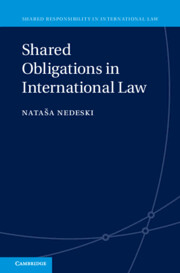Book contents
- Shared Obligations in International Law
- Shared Responsibility in International Law
- Shared Obligations in International Law
- Copyright page
- Contents
- Figures
- Table
- Acknowledgements
- Abbreviations
- 1 Setting the Scene
- 2 The Concept of Shared Obligations in International Law
- 3 The Distinction between Bilateral and Multilateral Legal Relations in the International Law of Obligations
- 4 Indivisible and Divisible Shared Obligations in International Law
- 5 Sharing International Obligations and the Determination of Shared Responsibility
- 6 Claiming Cessation and Reparation for Breaches of Shared Obligations
- 7 Conclusion
- Index
6 - Claiming Cessation and Reparation for Breaches of Shared Obligations
Published online by Cambridge University Press: 07 July 2022
- Shared Obligations in International Law
- Shared Responsibility in International Law
- Shared Obligations in International Law
- Copyright page
- Contents
- Figures
- Table
- Acknowledgements
- Abbreviations
- 1 Setting the Scene
- 2 The Concept of Shared Obligations in International Law
- 3 The Distinction between Bilateral and Multilateral Legal Relations in the International Law of Obligations
- 4 Indivisible and Divisible Shared Obligations in International Law
- 5 Sharing International Obligations and the Determination of Shared Responsibility
- 6 Claiming Cessation and Reparation for Breaches of Shared Obligations
- 7 Conclusion
- Index
Summary
The analysis in this chapter proceeds from the assumption that shared responsibility for a breach of a shared obligation has been established and focuses on the content of that responsibility. In the case that secondary obligations of reparation or cessation arise, what can be claimed from which responsible actor, and to what extent is this influenced by the fact that the underlying primary obligation is shared? And if injured parties wish to effectuate these secondary obligations through international adjudication, are there any obstacles to the claiming of cessation and reparation? It will ultimately be argued that conceiving of the content of shared responsibility as consisting of shared obligations incumbent on all responsible actors can help untangle which of the responsible states or international organizations is bound to do what in terms of cessation and reparation. In this context, the distinction between divisible and indivisible shared obligations has an important role to play. After all, determining whether responsible actors are each bound only to their own share of cessation or reparation or whether, alternatively, all of them become bound to achieve a common result has direct implications for what can be claimed from whom.
Keywords
- Type
- Chapter
- Information
- Shared Obligations in International Law , pp. 179 - 218Publisher: Cambridge University PressPrint publication year: 2022



